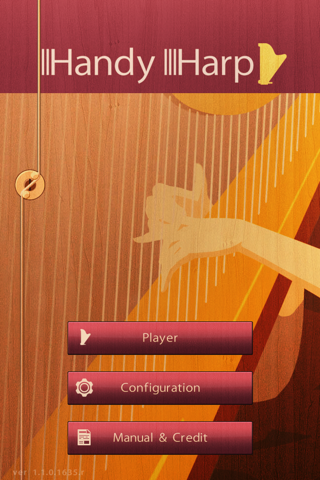
Handy Harp explains the complex mechanisms behind a concert harp through sounds and pictures, in an easy-to-use application where the design of harp pedals has been carefully recreated. Using the touch capabilities offered by the iPhone and iPad screen, you can manipulate these pedals easily, hear the changes of interval, and also watch the rotating discs prompting these changes.
Furthermore, the application allows you to quickly display 45 chord types, 28 modes, and the associated pedal settings. It supports MIDI Wi-Fi, allowing you to transfer play data from your iPhone or iPad to a Digital Audio Workstation as well as pedal diagrams to softwares such as Sibelius and Finale.
Handy Harp can be used in many different contexts: for those who want to understand the mechanisms of the harp, for harpists who want to write a pedal diagram on their sheet music, for composers and arrangers who want to try out different kinds of glissandi, and many other situations.
Handy Harp is available not only in Japanese, but also in English and in French. Its goal is to provide an easy-to-use tool that will become the new best friend of harpists, composers of film music and orchestrators. This is the beginning of a new era for harp!
[28 modes, 45 pre-recorded chords]
45 chords are pre-recorded (in twelve tones), for a total of 540 possibilities. 28 modes are also available (in twelve tones) for a total of 336 pedals tuning possibilities. It is possible to save up to 60 additional pedal settings.
[Rule Types]
You can select two different types of rules when displaying the scales and octaves: one that is commonly used by harpists, and the other based on the piano keyboard.
[Irregular Tuning]
Usually, each note on a harp is tuned in flat, but in order to support certain types of music, Handy Harp also features irregular tuning, thus allowing you to perform pieces of contemporary music.
[Keyboard]
In order to check the status of the harp pedals, and in addition to a concrete display, a piano keyboard shows the select notes (using letters). This allows you to easily check the tuning of the pedals.
[MIDI Wi-Fi]
By connecting your device to a computer through MIDI Wi-Fi, you can transfer your play data in MIDI format to a DAW and record them. This function will prove invaluable to composers and arrangers who lost a considerable amount of time recording each harp section.
[Transfer your pedal diagram to a music notation software]
You can transfer pedal diagrams to music notation softwares such as Sibelius and Finale.



